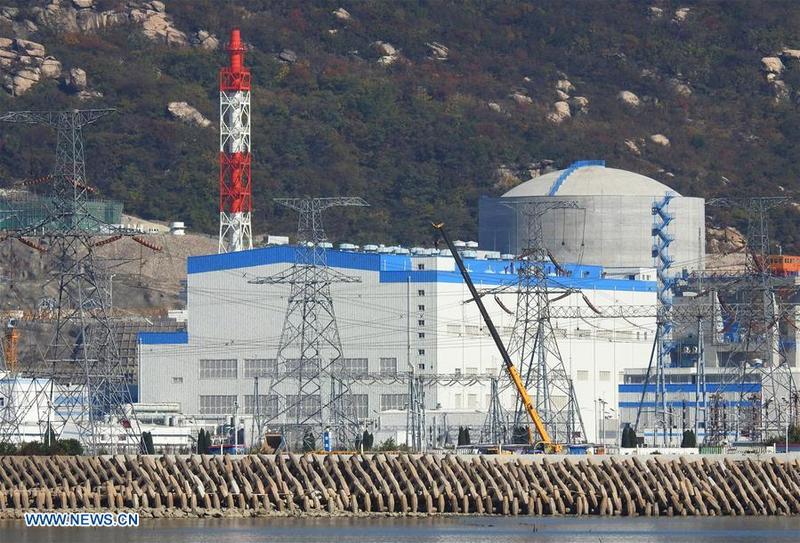



China dedicates to strengthen nuclear safety through government guidance, industry implementation and extensive public participation, according to a white paper titled Nuclear Safety in China released by the State Council Information Office of China on Tuesday.

Photo taken on Oct. 27, 2018 shows the exterior of the Tianwan Nuclear Power Plant in Lianyungang city in east China's Jiangsu province. [Photo/Xinhua]
Human factors are the most important in effectively ensuring nuclear safety. China is committed to strengthening nuclear safety culture, the white paper said.
The country has established a public communication mechanism for nuclear safety that combines supervision by the central government, guidance by local governments, implementation by enterprises and participation of the public. It regulates and guides the professional attitude and conduct, and encourages extensive public participation. It has created a positive atmosphere in which everyone shoulders responsibility, everyone participates, and the whole industry and society work together to safeguard nuclear safety, according to the white paper.
Government departments have given full play to the role of policy guidance and supervision and promoted an awareness of the paramount importance of nuclear safety, a sense of weighty responsibility, a rigorous and meticulous approach to regulation and a spirit of collaboration for further progress.
The country should actively cultivate and develop a culture of nuclear safety, and through education, regulations and positive influences, instill the core values of awareness of the rule of law, vigilance, self-discipline, and cooperation into the thoughts and actions of professionals, so as to fully mobilize and stimulate the positive role of human factors, the white paper said.
China has issued the Policy Statement on Nuclear Safety Culture, carried out special actions to promote this culture and established an assessment mechanism so that nuclear safety culture can be internalized in the mind, externalized into practice and further transformed into conscious action by professionals.
The country has also increased transparency in the operations of the government in accordance with the law and established a press spokesperson system and a mechanism of regular communication with the media, providing explanations on major nuclear safety policies and promptly releasing information on licensing examination and approval, surveillance and law enforcement, the overall safety situation, radiation environment quality, and incidents and accidents, with the aim of enhancing the transparency of government work and protecting the public's right to know, to participate and to supervise, said the white paper.
Nuclear-related enterprises, public institutions, research institutes and trade associations have attached great importance to and actively cultivated nuclear safety culture, setting up special institutions, allocating full-time personnel and exploring innovative new ideas, according to the white paper.
China has strengthened quality management, education and training, feedback on experience, evaluation, and improvement and effectively integrated nuclear safety culture into production, operation, scientific research and management.
Some excellent safety concepts have been generated, such as "rules must be in place; lines of accountability be clear; verification be performed, and documentation be available to refer to", and "put nuclear issues first, cherish cooperation, and take peace and harmony as the foundation", the white paper noted.
China has publicized important information in accordance with the law, including nuclear safety management rules and regulations, the safety status of nuclear facilities, radiation monitoring data on effluents and the environment around nuclear facilities and annual nuclear safety reports, and actively responded to public concerns about nuclear energy and nuclear safety.
The country has organized and carried out various activities to popularize nuclear science, such as "National Security Education Day", "Public Open Day (Week)", "Nuclear Safety Culture on Campus and in the Community" and "Popularizing Science in China, Green Nuclear Energy", according to the white paper.
Through discussions, field experiences, media publicity and other channels, understanding of nuclear safety is enhanced throughout society. Based on the principles of equality, extensiveness and convenience, we have established a mechanism for broad public participation, and fully solicited opinions on major nuclear safety issues concerning the public interest in the form of questionnaires, hearings, seminars and feasibility study meetings, said the white paper.
China has provided extensive publicity and education on nuclear safety for the whole of society, set up science popularization networks and new media platforms, built national education bases to popularize nuclear science and developed public publicity facilities and industrial tourism projects.
The country has included nuclear safety education into the training of officials and the education system for young people, and guided the public to understand, contribute to and maintain nuclear safety, the document noted.
